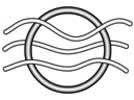


PRINCIPLES OF ECOLOGY
By Fritjof Capra
From website: www.ecoliteracy.org
Core concepts in ecology that describe the patterns and processes by which
nature sustains life.
NETWORKS
All members of an ecological community are interconnected in a
vast and intricate network of relationships, the web of life. They
derive their essential properties and, in fact, their very existence
from these relationships.
NESTED SYSTEMS
Throughout nature we find multi-leveled structures of systems
nesting within systems. Each of these forms an integrated whole
within a boundary while at the same time being a part of a larger
whole.
CYCLES
The interactions among the members of an ecological community
involve the exchange of energy and resources in continual cycles.
The cycles in an ecosystem intersect with larger cycles in the biore-
gion and in the planetary biosphere.
FLOWS
All organisms are open systems, which means that they need
to feed on a continual flow of energy and resources to stay
alive. The constant flow of solar energy sustains life and drives
all ecological cycles.
1 0 6
T h e P e a c e C o m p a n y

DEVELOPMENT
The unfolding of life, manifesting as development and learning at
the individual level and as evolution at the species level, involves an
interplay of creativity and mutual adaptation in which organisms
and environment coevolve.
DYNAMIC BALANCE
All ecological cycles act as feedback loops, so that the eco-
logical community regulates and organizes itself,
maintaining a state of dynamic balance characterized by
continual fluctuations.
P e a c e b u i l d i n g i n E v e r y d a y L i f e
1 0 7



